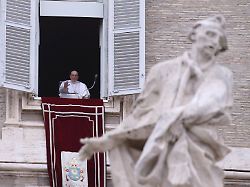“More than irritated”
The Union is also outraged by the Pope’s statement
March 11, 2024, 12:21 p.m
Should Kyiv raise white flags? With this statement, Pope Francis at least earned praise in Russia. On the other hand, there is sheer horror in Ukraine and among many German politicians – including those who explicitly profess Christianity.
At the top of the Union there is clear criticism of Pope Francis’ appeal for peace negotiations between Ukraine and Russia. “Hoisting white flags has solved nothing in Ukraine, quite the opposite,” said Hesse’s Prime Minister Boris Rhein when he arrived at a joint meeting of the presidiums of the CDU and CSU to approve the Union’s European election program in Berlin. As a devout Catholic, he finds it difficult to “understand what the Pope said. It doesn’t correspond to my opinion. I have a completely different view of things,” added the CDU politician.
Rhein added, referring to Russian President Vladimir Putin: “Because it must be clear to all of us that a Putin victory in Ukraine will have a terrible impact on Europe’s freedom. Nothing will be better if Putin wins there, everything will be worse.” CDU treasurer Julia Klöckner said that as a Catholic she was “more than irritated by this call to raise the white flag.” If you demand that someone who is being attacked surrender, “then that is a request to Mr. Putin to just carry on with the blessing of the church.”
The Pope had sparked massive opposition with a misleading appeal for peace negotiations in Russia’s war of aggression against Ukraine. In an interview on Swiss television, the 87-year-old also used the phrase “white flag” – a sign of surrender in times of war.
“Doesn’t correspond to my idea of support”
The Berlin CSU regional group leader Alexander Dobrindt said about the Pope’s statements that he had “difficulty understanding this reference. It does not correspond to my idea of supporting Ukraine’s right to self-defense.” He added: “That’s why we should perhaps reclassify this statement.” The head of the CSU parliamentary group in the Bavarian state parliament, Klaus Holetschek, said: “I think it was well-intentioned, but it was received wrongly and is certainly not the solution to this conflict.”
The chairman of the EPP group in the European Parliament, Manfred Weber from the CSU, spoke of an important signal if the Pope called for peace. “However, everyone who speaks out must make it clear that the aggression comes from Russia, that Russia started this war unprovoked. And that’s why the main message must be: Moscow end this war, Putin end this war.”
The Pope had already turned Ukraine against him last summer. In a video address in August, he addressed Catholic young people in St. Petersburg and described them as “the children of the great Russia, the great saints, the kings, Peter the Great, Catherine the Great, and a Russian people with great culture and “Humanity”. Since the Russian attack, Pope Francis has regularly called for peace in Ukraine, but without taking a clear position.
